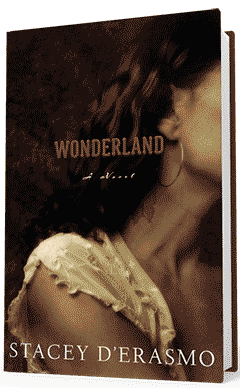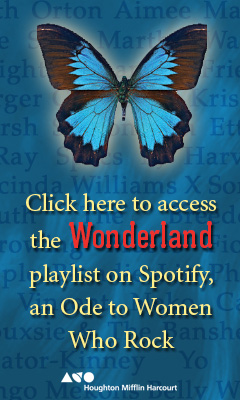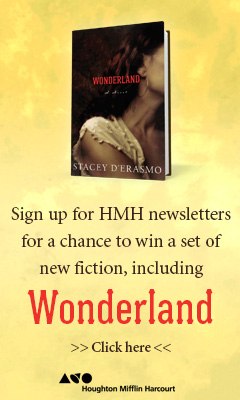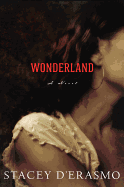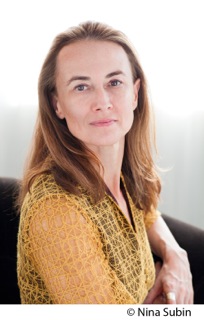Wonderland
by Stacey D'Erasmo
Wonderland, Stacey D'Erasmo's fourth novel, embeds the reader in singer and guitarist Anna Brundage's quest to reignite her indie-rock career with a new CD and a European tour at the age of 44. It's a percussive, lyrical and multisensory proxy walk on the wild side that also digs deep into Anna's past and artistic process.
Anna's childhood was bohemian in the extreme. Her father, an avant-garde sculptor who "preferred to cut things up that were already half ruined, left for dead," and her mother, a painter of "strangely ominous, strangely exposed, strangely linked groups of women on glass," prioritized travel and exposure to interesting people over schooling. Anna's younger sister opts out at the age of 13 for boarding school and traditional higher education, whereas Anna, who fell in love with a guitar at the age of six, remains diploma-free and "loyal to the family business of being outsiders, drifters." Her medium is musical, not visual, but she has internalized her father's artistic ethos: "I have had the conviction for quite some time that if I could do in music what my father did in space by sawing the train in half, then I could solve the mystery of my life."
In her 20s, Anna starts and loses a band and works as a singer-for-hire. In her 30s, when all she has to her name is "a vague ambition," about $1,000 and a sound-wizard friend with studio access, Anna gambles on a self-produced album. On the sixth night of a cocaine-fueled week searching for the right sound, Anna passes "through the eye of the needle to wonderland—to the broken, the illogical, the roads that double back on themselves" and she finds the small sonic shift that changes everything, the "awkward half-note" that will be Whale's signature and its appeal. The album that emerges "sounded simultaneously like a dress slipping off a bare shoulder and a girl falling down a well," and it launches Anna as a major indie rocker in 2002. Her initial tour for Whale is successful enough to get her signed by an "adventurous sub-label of a major label" and boost her first European tour. In Europe Anna performs a duet with a mega rock legend on stage at Glastonbury and makes the connection that will nab her entrée into a surreal chateau-based musical incubator for her second album, Bang Bang.
Anna's international rock-and-roll ride lasts until she is 37, when her third album fizzles and a high-intensity love affair ends. Beset by artistic doubt, Anna retreats to her tiny East Village apartment and drops out of the music scene for seven years. She marries Jim, a virtuoso fiddler, but the relationship does not survive her fallow period. What does survive is the job Jim helps Anna find: as a teacher of carpentry (a skill she learned from her father) to rich little girls at a private school on the Upper East Side.
When Anna decides to take a leave from her job and pursue a comeback, she has but one way to finance the new CD and a portion of the European tour: by selling her 21st birthday gifts from her father, a rare piece of rubble and a sketch from a famous work. To record Wonderland, she recruits her ex to help with the arrangements and to play some of the instruments. When the novel opens, Anna is already in quirky Christiania, Denmark, with a new young manager and a hired band. Anna/Alice's adventures in Wonderland are about to begin.
D'Erasmo's elegant, lush and precise language, funneled into a highly immediate, first-person stream-of-consciousness point of view, makes Anna's Wonderland tour entirely accessible, from the European locations to the intra-band dynamics to the encounters with other musicians to the sudden intimacies. Some sentences mimic thought, with phrases that lap and pile onto each other; others describe surroundings with singular details that make each setting memorable.
Remarkably, Wonderland offers an articulation of musical performance that is simultaneously abstract and concrete. Here's Anna at her first comeback performance in Christiania: "I blow the song through the back of the rickety concert hall and out into the night, folded, gleaming, fast, faster, unbroken, alive, whirling inside the secret chamber, rose and gold, unstoppable, irresistible, straight into the veins, hair-raising." When a performance goes wrong in a Hamburg dinner club, Anna susses out the drummer's dereliction on Wonderland's peculiar beat: "The unexpected shifts have grown all too expected; in fact, he's dropping into them a little too soon.... he wants to skip to the end, he wants his own dinner."
The through line of Wonderland is the tour, but the novel gains additional range and depth when Anna riffs on the past in chapters set off by past-tense narration. Anna's mental spelunking probes her musical breakthroughs and failures, vivid moments from her vagabond childhood and previous tours, vignettes from her life in New York and scenes from a love affair that may or may not be over. The question of whether she will return to her teaching job is charmingly embodied in the recurring image of "a hundred little girls in safety goggles, holding hammers," a mutely responsive chorus that pops up in Anna's mind at crucial tour junctures.
Literary without being difficult, and bracingly thought-provoking in its existential passages, Wonderland is replete with lyrical detail. There are trasmogrifying waves and tilts and recurring tactile talismans, such as the father-sculptor's red corduroy pants, the Brundage sisters' homemade hussar's coats in tulip red and sky blue felt, Anna's long red hair (sometimes loose, sometimes braided, sometimes pomaded), the sand of dunes and the sand of cocaine, a half-twisted slug of metal that Anna takes from her father's pocket--this is a novel rife with things in evocative halves: trains, musical notes, maps, gloves, truths.
Wonderland provides a thrilling and satisfying immersion in what it would be like to be Anna Brundage rocking her away across Europe, hanging out with iconic musicians, falling in and out and back into love and finding out where her second chance might take her. --Holloway McCandless



